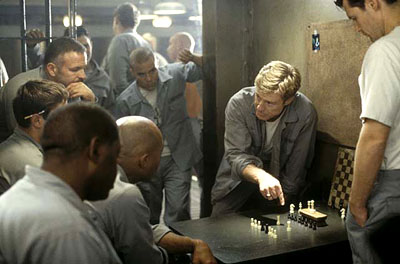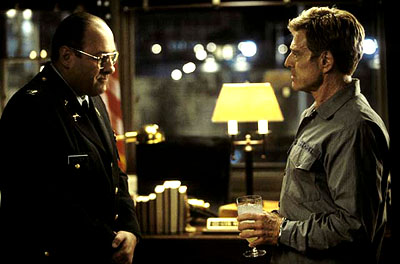

As familiar and predictable as The Last Castle is, it is a pleasant diversion for those who want a movie force-fed to them. Director Rod Lurie is making a career out of military/political films that boil down to a test of wills between two strong individuals. However, The Contender and the little seen but excellent Deterrence were better films, maybe because they seemed a little less fantastic. Sure a prison riot is exciting, but the lengths that Lurie goes to stretch credibility a little too far, even for a movie of this nature. The two people locked in mortal combat this time are Gen. Eugene Irwin (Robert Redford, The Horse Whisperer, Up Close & Personal) and Colonel Winter (James Gandolfini, The Mexican, 8MM). Irwin is a three star general, court martialed and sentenced to ten years at the Castle, a military prison run by Winter. Winter is a ruthless commander. He forbids saluting between prisoners, uses excessive force, and is the instigator of a number of "accidental" inmate killings.
Irwin cares nothing about this. He wants to serve his time so he can spend the rest of his life with his daughter and grandson. However, the longer he stays in the Castle, the more he realizes how unjust Winter's tactics are. The inmates look up to Irwin because of his rank and legendary reputation, and he soon believes that he must act in the best interests of the prison. This means removing Winter from command. To get around Winter's rules, the inmates run their hands through their hair instead of saluting. They call Irwin "Chief" instead of "General." The bulk of the movie concerns Irwin's gradual realization that Winter is not in the right, and his slow acceptance that he is the on that can do something about it. He rallies the inmates around him and their plans become increasingly brazen until the inevitable storming of the prison from the inside.
The actual riot is fun to watch; it's just that screenwriters David Scarpa and Graham Yost (Band of Brothers, Mission to Mars) go take things a little too far. Some of the men will surely want to help Irwin, but all of them? This is a military prison, and not everybody there will necessarily want to reform. There are surely some violent offenders mixed in with less dangerous people, and no amount of self-esteem speeches by anybody will change the former. Some of the contraptions that Irwin has his men build are ingenious, but how in the world could they build a catapult (or even pieces of a catapult) without the guards knowing? The script also has to make Winter an inept tactician, just so that Irwin and his men can get away with so much more. It is also amusing watching Irwin clear the cafeteria of guards so he can give his men a pep talk. However, the food servers (who presumably are more sympathetic to the guards than to the prisoners) are also attentively listening to Irwin rather than sounding an alarm. The Last Castle is heavy on imagery and symbolism. Lurie literally throws things in the face of the viewer with no hint of subtlety. A chess game, the name "Winter," a wall the inmates are building, they all represent some aspect of Winter or Irwin, the prison situation, or the battle between the two men. Hey, is that Winter listening to Salieri? Gee, what does that imply about his intentions and feelings towards Mozart, uh, Irwin?
For somebody just about to being receiving Social Security, Redford is in amazing shape. He delivers a low-key performance, emphasizing the fact that Irwin is not forcing the men to do his will, they are willingly helping him. At times he is so low-key that he is like a passive participant. This is the line that Redford must tread, since Lurie wants the Irwin character to always appear more innocuous than he actually is. Gandolfini's Winter is too flat to make any serious impression. This is unfortunate, especially after such a complex role in The Mexican. The largest disappointment is Mark Ruffalo (You Can Count on Me, Committed), who uses the same mannerisms he did in You Can Count on Me to much less effect here. He plays the prison bookie who may or may not betray Irwin to Winter in exchange for an early release. But like much of the last half of the movie, Ruffalo's actions are predictable. At this point, The Last Castle goes on autopilot towards the end.